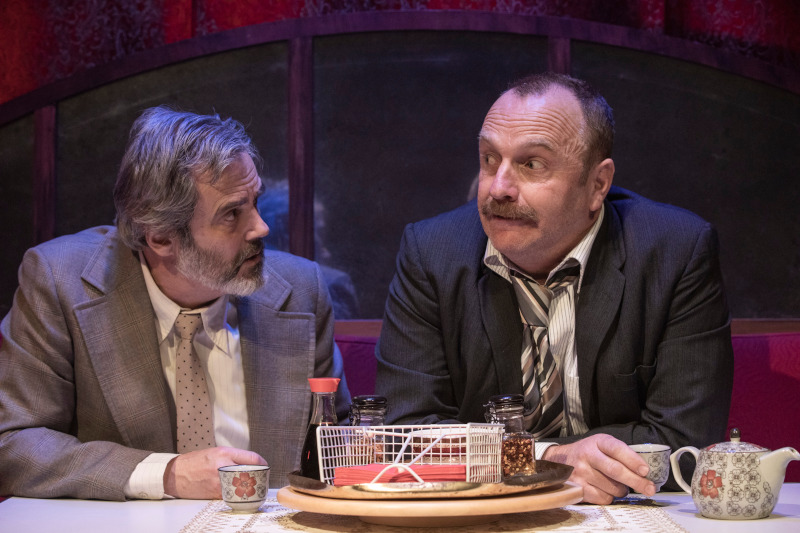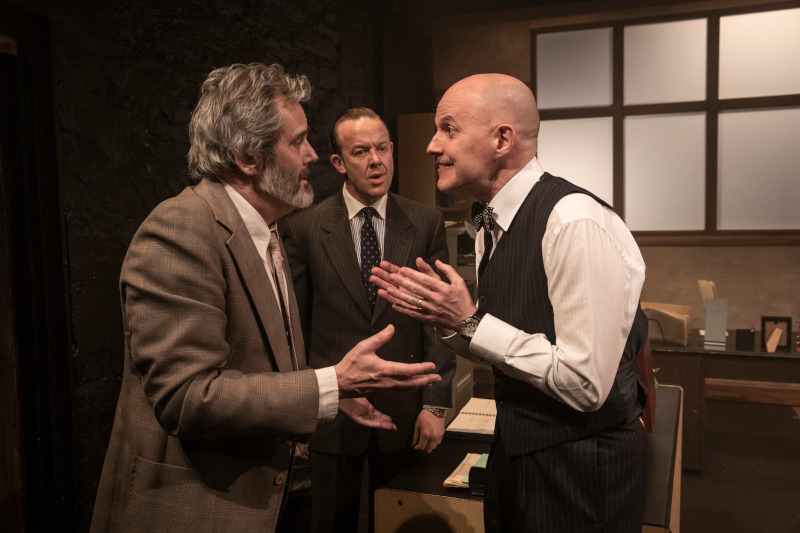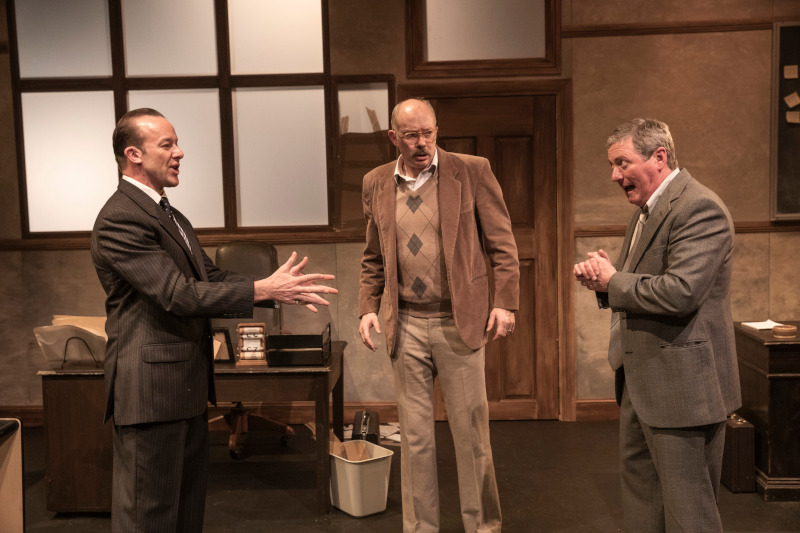Glengarry Glen Ross
By David Mamet
Flying Penguin Productions
The Bakehouse.
September 11.
Until September 25.
Murray Bramwell

L-R. Nicholas Garsden / Christopher Pitman. Photo: Shane Reid
Talking about the Art of the Deal has certainly lost its lustre thanks to the Shyster-in-Chief, Donald Trump, but the cult of the salesman, the samurai emissary of predatory capitalism, has been on the nose ever since Willy Loman discovered his pitiful net worth in Death of a Salesman, Arthur Miller’s bitter tragedy of The American Dream, which premiered on Broadway in 1949.
David Mamet’s Pulitzer Prize winning Glengarry Glen Ross first performed in New York thirty five years later in 1984. It was based on the writer’s brief experience in a real estate office and covers two days and a night in the life of four Chicago agents in their frenzied efforts to sell dud real estate to prospective buyers whose names have come from lists assembled in what seems like an early form of data harvesting.
The game is to set up appointments – these are called leads, the luckless clients are prospects, and the meetings are called sits – where hasty, deceptive, ill-advised deals are closed. All done and dastardly; like having lunch with a vulture except you are the meal.
Mamet’s agents live on the edge of their nerves, trapped in an office pecking order that has top operators getting the best prospects and the bottom-end salesmen scavenging the sloppy seconds. Willy Loman’s cruel but orderly office has now become a feral circus of treachery and desperation. Thirty seven years ago Mamet’s play predicted the amoral greed of the Eighties which led to the 1987 crash and the criminal subprime real estate scandals which took down Lehman Brothers and thousands of others in the Wall Street meltdown of 2008.
Conducting their business in a wheedling scattergun manner, using verbal three-pea-tricks in a blizzard patois of expletive, repetition and accelerating anxiety, these agents are the slam poets of bullshit and evasion. It is rather like the way Scott Morrison speaks – without the F-words. Nowadays we call it talking in word salad.

L-R. Nicholas Garsden / Mark Saturno / Bill Allert. Photo: Shane Reid
In the Flying Penguins production now opened at the Bakehouse, director David Mealor has assembled an excellent cast to revive this parable of vulpine commerce. But it is never clear how much Glengarry Glen Ross is a critique of toxic masculinity and how much it has a sly fascination with men behaving badly.
Time (and the Me Too movement) has not been kind to Mamet’s machismo take on the world and he has become more belligerently libertarian in his views. Of course there are no women in this play – except the one, unseen, deal-breaker. So, how do we view these agents, gnashing and battling each other (and the clock) to either win the Cadillac or get fired for being time-wasting failures ?
Early productions of Mamet’s plays like Speed the Plow and Glengarry often looked to portray a kind of wounded heroism in these men, lending a hint of the noble in the savagery, of courage in the spite. Miller invites us to consider Willy Loman as a fallen Greek in the endless Trojan wars, and Mamet does something similar with Shelly Levine – especially in his screenplay for the film version, rewritten for Jack Lemmon, the archetypal actor of the besieged American Male.
Mealor wisely avoids that self-serving tightrope of heroic ambivalence, opting for the grim, black nihilist comedy that the play has irrevocably become. Kathryn Sproul’s concise set (carefully lit by Tom Kitney) is neatly proportioned for the Bakehouse box stage. In Act One there is scarlet padded seating and an opaque decorative screen for the Chinese restaurant scenes featuring boisterous collusions and snarlings between the salesmen and the wine-and-dine finessing of a mug punter.

L-R. Mark Saturno / James Wardlaw / Rory Walker. Photo: Shane Reid
Act Two reveals the engine room for all this elaborate piracy – a shabby brown pre-modern office with a competitive sales target board, battered desks and rackety typewriters. It is like a gumshoe’s lair, or a seedy scene in a Hopper painting.
Sproul’s costumes match the economic hierarchy- smart striped tailoring, cufflinks and well-ironed shirts for the top dogs and cheap bookie turd-coloured suits for those on the down escalator to redundancy. Quentin Grant’s incidental music insinuates itself throughout – ambling jazz piano, downbeat bass clarinet and splashes of drum and cymbal.
The players are evenly terrific. The scene between Nicholas Garsden (as the defeated, insecure George Aaronow) and Christopher Pitman (as the hyper-manic, coked-up desperado Dave Moss) where they discuss a robbery that is – and isn’t – a plan, is a savagely funny highlight. It is also Mamet’s dialogue at its most droll. James Wardlaw is suitably gormless as James Lingk, the buyer who goes missing at the 11th hour, and Chris Asimos as Baylen, the police investigator, steers among the mayhem with ease.
Mark Saturno (like Asimos, coming straight off State Theatre’s Hibernation) is excellent as Richard Roma, the alpha hyena in the office. Saturno thrives on such combative characters (his lead in State’s A View From the Bridge was also memorable) and he has fast-talking American dialogue on a string.
As John Williamson, Bill Allert makes a welcome return to a Flying Penguin production. As the Uriah Heep-ish office organiser, he represents the endlessly new managerialism which rises above the real earners in the company. He out-manoeuvres the successful dealers and bullies the weak and the aging. Allert’s unflappable calm as he turns the screw on his team has a chillingly familiar universality about it.
Never is Allert better than in his scenes with Rory Walker whose portrait of Shelly Levine is a compelling mix of drive and fatigue, menace and terror, scathing wit and abject defeat. As he begs for premium leads to show he can still close the deal Allert has him grovelling in a pit not even Willy Loman understood. His speeches are disconcerting because their ferocious comedy clashes with almost unbearable doom. It is another splendid character role from Walker and central to the play’s success.
David Mealor has brought together an outstanding ensemble and a reading of Mamet’s text that keeps it sharp and current. The Flying Penguins are soaring again with this production. I have said before – Adelaide needs a permanent rep company of this calibre to remind us of the richness of the theatre of the recent past; those plays which have been left in the drawer too long.
Glengarry Glen Ross is playing at The Bakehouse until September 25.
